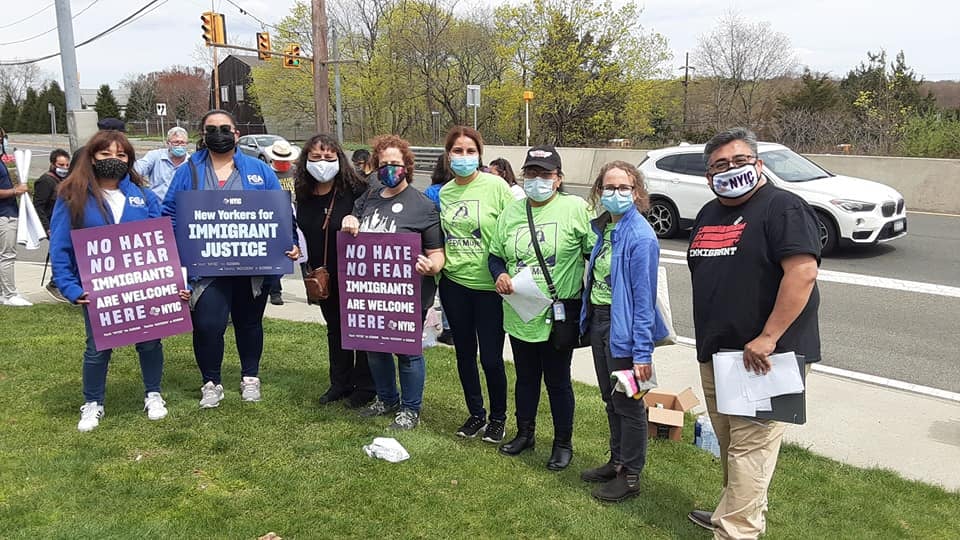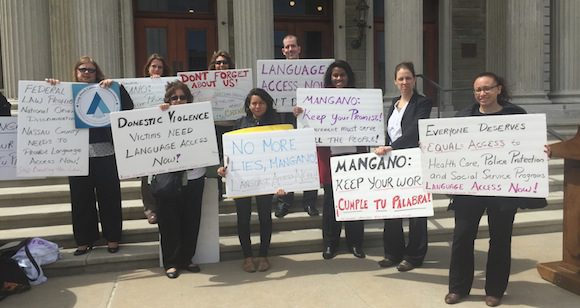By Athena Dawson
Last September, nearly 10 years after New York State and Nassau County issued orders to ensure that those who speak a language other than English receive government services, the Long Island Language Advocates Coalition and New York Immigration Coalition released a joint language access report, raising concerns whether true reforms were ever instituted.
Four months later, Nassau officials, including County Executive Bruce Blakeman, a Republican from the Five Towns, have yet to respond to the groups’ findings.
The report detailed the interactions that seven Spanish-speaking volunteer testers had with the Nassau County Police Department. The testers made 94 calls seeking non-emergency information from the department. The report revealed that the testers were unable to obtain language assistance nearly half the time.
LILAC Coordinator Cheryl Keshner said organization officials raised their concerns at a Hispanic Heritage Month meeting last September at the NCPD training center in Uniondale (in an area formerly known as East Garden City). The reaction from county officials was “very defensive,” Keshner said, noting that Police Commissioner Patrick Ryder did not attend the session.
Deputy Police Commissioner Kevin Smith and Sgt. Sabrina Gregg, the department’s language access coordinator, did attend, though.
Ryder and Gregg declined requests for comment from this reporter. But the NCPD did issue an email statement that read, “The Nassau County Police Department continues to work with our Language Access Line to ensure that all individuals with limited English proficiency are able to communicate with the Police Department should the need arise.”
“We’ve contacted the police department repeatedly for years to let them know about” problems with language access, Keshner said.

In January 2013, then Attorney General Eric T. Schneiderman, a Democrat, penned a letter to the NCPD, directing the department to work with his office to strengthen language access services for limited English proficiency residents.
That same year, then Nassau County Executive Edward Mangano, a Republican from Bethpage, signed Executive Orders 67 and 72. Executive Order 67 urged agencies that receive federal funding to offer equal access to services for those with limited English proficiency.
County agencies were required to interpret and translate documents in Spanish, Haitian Creole, Farsi, Italian, simplified Chinese and Korean.
Language access advocates sought greater services, though, prompting Mangano to sign Executive Order 72, requiring county agencies to submit lists of bilingual workers and their own language access plans.
“We’ve contacted the police department repeatedly for years to let them know about” problems with language access.
Cheryl Keshner, Coordinator, Long Island Language Advocate Coalition
Keshner said Mangano signed the second order reluctantly. “The language [of Executive Order 67] was not what we had agreed to,” Keshner said. “After we made it very clear we were not happy about it and we were going to go public about this, they agreed to sign the second executive order, which added some additional requirements.”
After that, Keshner said she saw little change in the NCPD, however. LILAC contacted the state attorney general’s office several times, but little progress was made, she said.
At one point, LILAC officials did meet with a prior police commissioner, and “we did see some promising signs of change,” but there has been no real change since, she said.
In 2014, LILAC officials and other language advocates held a news conference in front of the Nassau County Executive and Legislative Building in Mineola to highlight a report titled “Language Access Denied: Ed Mangano’s Broken Promise to Nassau County.”
LILAC had conducted testing that August to see how well county agencies had complied with the executive orders. Agencies in the report included the police department, the Department of Health, Department of Human Services, Department of Social Services and Probation Department.
The study showed that only the social services department had developed a language access plan.
In April 2015, LILAC performed additional, more robust tests, including having callers who spoke Mandarin and Haitian Creole request language access services.
LILAC met with Ryder in 2019, and since then, there has been a “consistent refusal to recognize that this is an issue that needs to be addressed,” Keshner said.
“It’s sort of an indication of how they deal with the community,” she added.
Sociologist Dr. Karen Tejada, a LILAC volunteer who attended the meeting last September with NCPD officials, said, “You can have transparency with data…You’re not just collecting the data that shows all of the successful calls, but you’re also collecting the ones that perhaps don’t show high rates of success.”







